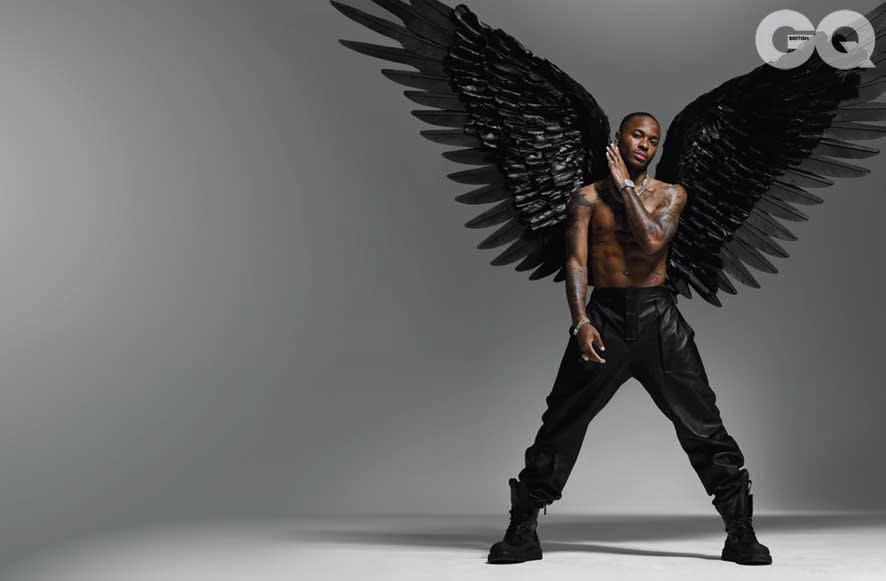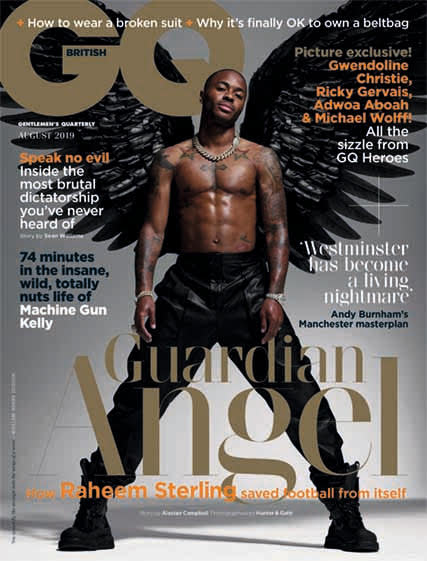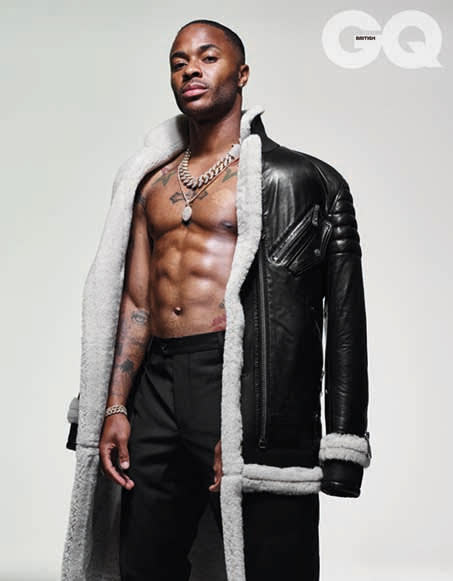Raheem Sterling admits possible Manchester City departure

Raheem Sterling has admitted that he would one day like to leave Premier League Champions Manchester City and play abroad.
In a wide-ranging interview with GQ, the England winger opens up on moving to England, racism, that Instagram post and his ambitions as a player.
In the short term, Sterling says he is committed to City but refuses to rule out a change of scenery further down the line.
“I love it here. This is one of the best clubs in the world and I’m here for the long haul,” he said. “But you just don’t know what happens in the future. I’m still young and, like I say, I am loving every minute.
“Ever since I was a kid, 100 per cent it’s always been a dream of mine to play abroad somewhere.”
The 24-year-old star suggested a possible more to one of Europe’s warmer countries, however ruled out a more to Germany, admitting the language would be difficult for him to grasp.
He added: “I hear Leroy and Ilkay talking and sometimes I think they’re having me on. I’m like, ‘You lot are not speaking to each other. That’s not a language I could do.’
“I would need to see where it’s minimum 17C or 18C constantly.”

READ MORE: Gossip - Man United ‘will have to make Maguire most expensive defender of all time’ to seal signing
READ MORE: England defeat was most-watched TV programme of the year
For now Sterling is very much planning on staying at the Etihad, citing the fact that playing under Pep Guardiola will continue to benefit his development.
“He’s demanding, but it’s good. It makes you want to do better and – I don’t know how to explain this – makes you want to prove to him and show him every time you go on the field you’re playing for your position in his team.
“Every season it’s trying to do something better than last. We didn’t make it to the Champions League final but that’s something at this club we really want to do.
“Every year there have always got to be goals and from a young age I set out what I wanted to do.
Born in Jamaica, Sterling moved to England as a child and remembers the culture shock particularly when it came to the weather.
“I remember having a massive jacket on.
“We were used to 20C, 29C, 30C and it was around Christmas, so it was really, really cold.”
Sterling went on to join the QPR academy where his talent was obvious, eventually catching the eye of Liverpool.
“I was at QPR, always playing years above. At QPR I was maybe 14 playing under-18s.
“[Joining Liverpool] was a big moment for me. I remember just going to QPR one day and they said ‘you can’t play today.’
“I said ‘why?’ And they said ‘you’re going up to Liverpool tomorrow.’”
Far from being overawed by such a big move at such a young age, Sterling was driven to succeed both for the Reds and beyond.
“When I got into Liverpool I said if I haven’t won the Premier League by the time I’m 21, I need to look at my options and see what I’m doing there.
“And I came to City and won my first Premier League. It’s just good to know what I’ve set out to do.”
But that 2014 departure from Anfield proved to be a controversial one, with many on Merseyside still unhappy that a player who had essentially grown up at the club decided to leave.
“Everyone’s got ambitions, this club has ambitions... I remember my agent and I had a conversation and he just told me this is a brutal sport at times.
“So if you have the opportunity and you think it’s right for you to leave a club and that’s your dream, do it. Because if it’s the other way around, the club would do the exact same thing to you without thinking twice.”

READ MORE: ‘It was bu*****t’ - Messi blasts refereeing after Argentina’s Copa America loss to Brazil
READ MORE: Jesus blasts Brazil into Copa America final
Rather than lauded for his ambition and desire to improve, Sterling was widely criticised for his decision and painted in a negative light by sections of the press.
The player was portrayed in some sections of the media as ‘greedy’, ‘flashy’ and motivated solely by money - irrespective of his performances on the pitch for his new side.
He added: “It started to get petty, so silly. I think the worst one for me was they used pictures of every car I’ve bought from about 17 until I was 22 or 23.
“I drive into training, so they could take pictures and use these cars bought over the years and say ‘this is his car on Monday, on Tuesday, on Wednesday, Thursday, Friday.’
“But it was cars I’ve had, sold, then got a new one. They made it like I had one for every day of the week. For me, it was like what are you trying to get at here?”
“There was a point when I left Liverpool I actually thought why should this little black kid have this money? That’s at one point how I felt, the stories that were coming out... Why should he?”
Race, Sterling believed, was at the heart of much of the criticism and abuse he would go on to receive.
Things came to a head when City faced Chelsea at Stamford Bridge last season and fans were seen shouting obscenities, including one of racist nature.
Sterling knew this wasn’t an isolated incident and took to social media to highlight the differences in how black and white players are portrayed in British newspapers.
He said: “I was thinking of the wording, the subtle messages that newspapers use, that’s had a massive effect on how the public perceive a lot of young black players, because you start associating the words ‘bling’ at the end of sentences, you start associating subtle words, so people think, ‘OK, this person is this sort of character.’
“If the public don’t see you on a regular basis and don’t know you, that’s what their perception of you is going to be. That’s who they think you are and that’s how they’re going to judge you unless you’re on the football field.”
Following the post, Sterling was roundly praised for his stance, and for bringing awareness to the issue.
“I never thought it would have such a massive impact,” he added. “It’s great to know people are listening. The one thing about people in this country is they are always willing to listen. I’m really grateful for that.
“I was just trying to put a point across just to do better in newspapers... It was more ‘Just open your eyes and give people a fair chance.’ It wasn’t having a go; it was more trying to do it in a way that was calm. And people got the message.”
The incident at Chelsea wasn’t the only occasion Sterling had been a victim of racism from the stands. More recently, during a Euro 2020 qualifier in Montenegro, the City man and fellow black players Danny Rose and Callum Hudson-Odoi were subjected to monkey chants while playing for England.
The incident sparked a discussion as to whether players should walk off during matches as a form of protest against fan racism.
Sterling doesn’t believe that course of action would be appropriate and would rather let his football do the talking.
“I wouldn’t, not during a game. If it was a continuous thing happening to me, after a while I might go on strike, but I wouldn’t want the game to stop and come off the field,” he said.
“You want to show them that you’re bigger than that. I’m not the sort of person to show their emotions. I try to prove them wrong and make that person hate me even more for doing the right thing.”
The full interview can be seen in the August issue of British GQ, available on newsstands and digital download on Friday 5th July 2019. www.gq.co.uk

 Yahoo Sport
Yahoo Sport 





































